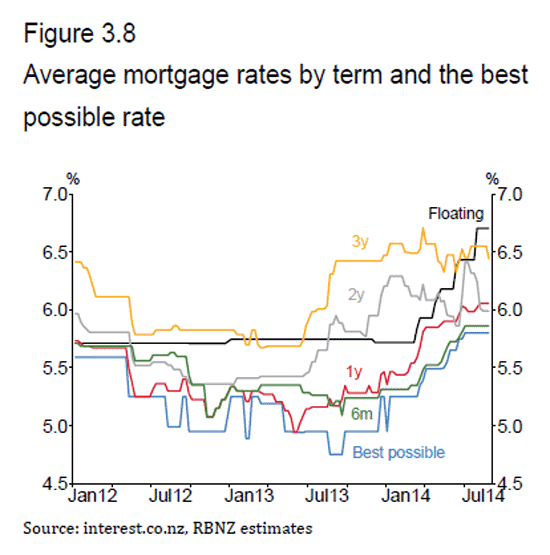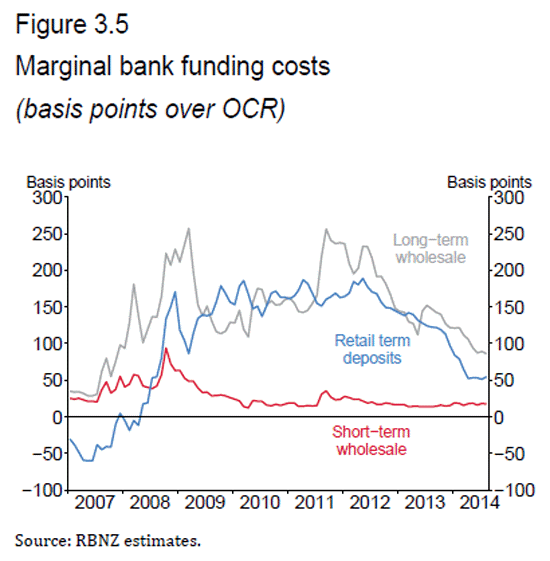
By Gareth Vaughan
Reserve Bank Governor Graeme Wheeler says Official Cash Rate increases will take a toll on mortgage rates, and despite four OCR increases this year the OCR remains about 100 basis points below a "neutral" rate.
As widely expected the Reserve Bank today held the OCR at 3.5%, but reduced its forecast peak for interest rates by around 0.5% to around 4.8% by 2017.
Despite strong competition between banks in a low growth market keeping a lid on fixed-term mortgage interest rates, Wheeler reiterated that he believes the OCR hikes are being, and will continue to be, felt in borrowers' hip pockets. Wheeler also again compared the short duration of New Zealand mortgages to the much longer duration of mortgages in the United States, where he lived prior to succeeding Alan Bollard as Reserve Bank Governor in September 2012.
"If you look at the mortgage market here the interest rate duration is incredibly low. In the States 30 year fixed mortgages are the sort of standard mortgage, where the interest rate duration's very long. Here it's extremely low. You've got 30%, for example, of the mortgages (as) basically floating rate mortgages, you've got another 32% that are fixed for less than a year," said Wheeler.
"So you are going to see monetary policy working in terms of the average time to when you get a rate reset, which I think at this moment is about ten and a half months."
His comments on Thursday are similar to ones he made at the last Monetary Policy Statement media briefing in June.
'Best possible rate' rises to 5.8%
In its latest Monetary Policy Statement the Reserve Bank said although fixed mortgage rates have moved only marginally since May, over the past year rates are up more substantially.
"The best possible (carded) rate over all durations from the major banks has risen from a low of 4.75% in September 2013 to 5.8% at the end of August 2014. This fully reflects the 100 basis points of hikes in the OCR this year, much of which was anticipated by markets and thereby priced into the mortgage curve long before the first OCR increase actually occurred," the Reserve Bank said.
"The attractiveness of fixed mortgage rates compared with the higher floating rate is encouraging householders to fix their mortgages. The trend towards fixed rates is not new, with the proportion of mortgage holders on floating rates steadily declining since its peak of 63% in April 2012 to 29.9% in July 2014. The recent trend has been for borrowers to fix at the longer durations of two or three years. There were about $11.3 billion of mortgage flows into the one-to-three year fixed-rate buckets in the three months to July, up from only $3.9 billion over the same period a year ago."
"These flows pushed up the average time to re-price mortgages to 10.9 months in July, more than double the low of 4.7 months in 2012. The average two-year fixed mortgage rate from the big four banks is currently 5.99%, up slightly from 5.95% at the end of May," the Reserve Bank said.
With the Reserve Bank an outlier among central banks in developed economies in the sense that it has been increasing interest rates, Wheeler said a flattening in the yield curve was no surprise.
" So it's almost inevitable as you tighten and banks continue to finance offshore, that the yield curve will start to flatten," said Wheeler.
See all bank advertised, or carded, home loan rates here.
'100 basis points below neutral'
Meanwhile, Wheeler also made it clear further OCR hikes in the current tightening cycle remain on the agenda.
"We think some further policy tightening will be needed. If you look at interest rates (OCR) now, we've tightened four times. But they're still below neutral. We think the neutral interest rate is probably around 4.5%. So we're essentially about 100 basis points below neutral. So in that sense we're still acting in a stimulatory way in terms of impetus to growth even though we have tightened four times," said Wheeler.

Bank funding costs 'stabilise'
The Reserve Bank said after dropping for about two years, bank funding costs have now stabilised.
"After trending lower since mid-2012, bank funding margins have stabilised over recent months at an estimated 40 basis points over the OCR. Long-term wholesale rate spreads have fallen significantly since the Global Financial Crisis and European Sovereign Debt Crisis, but have stabilised over the past few months (figure 3.5). After contributing to falling funding costs since 2012, the spread to the OCR on retail term deposits has flattened out this year, as deposit growth has slowed," the Reserve Bank said.

4 Comments
"If you look at the mortgage market here the interest rate duration is incredibly low. In the States 30 year fixed mortgages are the sort of standard mortgage, where the interest rate duration's very long. Here it's extremely low.
Moreover, in the US the homeowner has the asymmetrical right to opt for a lower rate mortgage if term rates are falling, as has been the case post central bank QE. Hence the reality of negative convexity hedging issues associated with mortgage backed securities.
Not that long ago it was "Fix,Fix,Fix - Interest rates are on the way up"
Despite financial comentators (who are so close to the trees they cannot see the wood) and bank economists predicting rate rises for the past four years we still have not seen the booming interest rates they have been predictiing. Not only have i, but also many others who post comments have been arguing otherwise. Rate increases are as justified as power price increases - Greed.
Being a bank economist or a Financial reporter is just like being a Rugby reporter. You can talk a load of crap and there are no consequences. Because of a lack of consequenses you are free to talk all the crap you like.
Wheeler - your home mortgage OCR target is hitting my business loans first :(
- - -
And of course people try to pay the home loans off faster than other countries, we have the highest interest rates so prompt payback is very important - we also have quite high financial volitility - in interest rates but more importantly in an unstable wage marketplace.
NZer's don't have the luxury of paying 2% with minor impact on income for 30yrs
Is Wheeler under instructions from the IMF, World Bank etc to crash the NZ economy so NZ can join the rest of the world in deflation and deep recession?

We welcome your comments below. If you are not already registered, please register to comment
Remember we welcome robust, respectful and insightful debate. We don't welcome abusive or defamatory comments and will de-register those repeatedly making such comments. Our current comment policy is here.